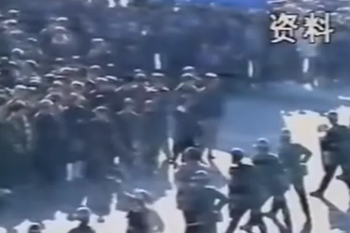China: Come clean about the killings in Ghulja and internment camps deaths

For immediate release
February 4, 2019 10:30 am EST
Contact: Uyghur Human Rights Project +1 (202) 478 1920
On February 5, 1997, Chinese security forces violently suppressed Uyghurs protesters calling for an end to religious repression and ethnic discrimination in Ghulja.
Twenty-two years later the unlawful killing of Uyghur demonstrators in Ghulja remains uninvestigated, as the Chinese government conducts a campaign of mass internment and imprisonment.
The Chinese authorities’ zero tolerance for peaceful dissent in 1997 has developed into the targeting of any Uyghur in a bid to eradicate the Uyghur identity and culture.
Concerned governments must now seriously consider targeted sanctions on Chinese officials and entities complicit in human rights violations. UHRP urges the application of sanctions under Global Magnitsky Human Rights Accountability legislation in effect in the U.S., Canada, and several other countries. The world’s inaction after the Ghulja Massacre should not be repeated in the 21st Century.
“The massacre of peaceful protestors in Ghulja left families across the city in mourning. The victims’ loved ones still bear that pain twenty-two years later as the government denies the existence of extrajudicial killings on February 5, 1997,” said Uyghur Human Rights Project Director Omer Kanat.
Mr. Kanat added: “The repression has spread in an alarming fashion. The internment of over one million Uyghurs and other Turkic Muslims means all families today live in a constant state of fear. They do not know the whereabouts and condition of their loved ones, or even if they themselves will be spared from the camps. The psychological trauma will be with us for generations.”
Among the policies that prompted the 1997 demonstration in Ghulja was the prohibition on traditional Uyghur gatherings known as meshrep. Chinese authorities banned meshrep just prior to the demonstration, even though Uyghur communities were using the meshrep to successfully resolve social issues among young Uyghurs.
Human rights organizations documented a pattern of arbitrary imprisonment, torture in detention and unfair trials of those rounded up during the Ghulja protest. In the case of Abdurazzak Shamseden, Amnesty International identified evidence of egregious rights abuses, including extracting confessions based on torture, and warned of further risk of torture. For their alleged role, several Uyghur participants were executed. Despite credible evidence describing state violence used against Uyghur civilians, the extrajudicial killings have been recast as “the beginning of active terrorism in the country.”
Chinese authorities have called the internment camps “vocational training centers” and claim the facilities are a key aspect of Beijing’s counter-terrorism strategy. Reports of deaths and torture in the camps have not been investigated by the state officials. Uyghurs and other Turkic Muslims known to have died in custody or shortly after their release include:
The internment of Uyghur intellectuals belies the Chinese government’s assertions that the camps are an effort to de-radicalize the population and combat terrorism. Instead it is part of a coordinated effort to undermine and eliminate a distinct Uyghur identity as rapidly as possible in an unprecedentedly aggressive forced assimilation campaign. UHRP recently documented 338 intellectuals as disappeared, interned or imprisoned.
UHRP calls on governments, Muslim leaders, companies, and academic institutions to end business as usual with the government of China, at a time when it is expanding concentration camps for Uyghurs and other Turkic Muslim groups.
